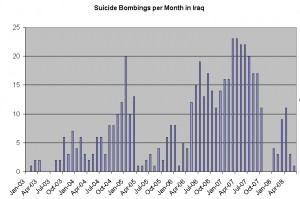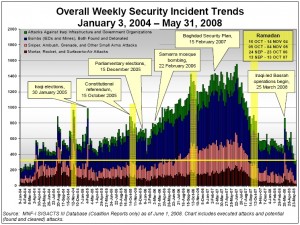Defeating IEDs and Bombs: The Lessons of Iraq for Afghanistan
BY Herschel SmithJcustis of the Small Wars Council recently started a SWC discussion thread that should have gotten more attention than it did. He linked a previously unknown (to the SWC) Wikipedia entry on suicide bombings in Iraq since 2003. Right behind this entry, Schmedlap made the following observation:
One thing that I would point out, that is illustrated well by the article if you look for it – note the suicide attacks in the summer of 2007, particularly July and August. Contrary to the narrative that the dip in violence after August was due to a Sadr militia “ceasefire,” the dip was actually due to a significant drop in the number and effectiveness of AQI mass casualty attacks. In particular, note that hundreds of those victims were in northern Iraq (Kirkuk, Tal Afar, predominantly Sunni Arab areas of Diyala, etc), not in Sadrist strongholds. Violence from Sadr’s militia dropped two months prior to him calling the “ceasefire.” The only thing that kept the death toll high in the interim between June/July 07 and the “ceasefire” in late August was the rate of murders by AQI. Take out the AQI murders and you have a steady drop in civilan deaths beginning in June/July, not late August. The credit for this reduction goes to MNF-I and the ISF, not Sadr.
This is an interesting and important point, one that bears detailing a bit more. The EXCEL graph below shows the suicide bombings per month based on the Wikipedia entry (click to enlarge).
One possible defeater argument for the hypothesis would be that the discussion so far only deals with suicide bombings and not overall security incidents. Care of the Mudville Gazette, an EXCEL graph of the weekly security incidents is found in the June 2008 Multinational Force Report to Congress.
The look of the trends is basically the same. In 2006 and into 2007, the tribal revolt against al Qaeda was in full swing, with AQ losing badly in the Western part of Anbar, most importantly in Ramadi, the capital of Anbar. AQ was pushed Eastward towards Fallujah, and had made this area (and into Baghdad) their final stand in Anbar. Operation Alljah (which began in April of 2007 and ended in the late summer of 2007) essentially ended the AQ presence in Fallujah, at which point they were on the run Northward into the Diyala Province and towards Mosul.
Along with this evolution, the Baghdad security plan was implemented early in 2007, pressuring AQ in and around the capital city. This continual pressure on AQ caused a precipitous decrease in not only suicide bomgings, but overall security incidents (the basic trends mirroring each other). The point is that while good body armor is desirable against snipers, it can only accomplish so much. While MRAPs are desirable to ameliorate the affect of IEDs, they are only so good – dismounted patrols have to be conducted as well.
In the end, one of the most important lessons of Operation Iraqi Freedom is that presence with the population, intelligence-driven raids, and pressure on the enemy are the best tools against IEDs and bombings. Military pressure is proactive, while all other tools are defensive and reactive.
There has begun to be a steady flow of horrific reports of bombs, IEDs and Marines who have perished or become wounded in Afghanistan. Four Marines deployed out of Twentynine Palms died from a roadside bomb. Marine Sgt. Justin Clenard – badly wounded – was on foot patrol with his platoon when they were hit by a mortar round or a land mine. Clenard lost his right leg from the knee down and his lower left leg as well. Lance Corporal Justin Rokohl entered his ninth hour of surgery in a military hospital in Germany on Monday night, being wounded from a roadside bomb. Navy Corpsman Dustin Burnett died from a roadside bomb in Afghanistan. And Lance Cpl. Andrew Francis Whitacre has died in Afghanistan. He had one last wish.
“I want to take a second and thank all of you who support us in what we do,” Andrew wrote two months before his death. “I know many of you do not believe in the wars we are fighting in. Just remember that all the men and women who are here are here because at one point they took an oath to protect and serve YOU. The support of the citizens of the country we fight and die for is all that we ask.”
There are more than mentioned above. The support of our warriors means the proper resourcing of the campaign. Germany is deploying more troops to Afghanistan, but their rules of engagement are not changing and they will not be allowed to participate in combat except in self defense, and they will not be deployed to the most violent parts of Afghanistan.
This isn’t enough. There will continue to be a dreadful flow of reports from the Afghanistan theater until force projection is applied. Common sense suggests it, and the data proves it. This means more troops, and more robust force presence with the population and the enemy, including the ROE to get the job done. This is the last wish of one Marine and his parents who have given everything.







On June 26, 2008 at 4:33 pm, jonesgp1996 said:
I could not agree more with the assessment here.
However, as I’ve mentioned in a previous posting related to ISAF/OEF, there will not be enough troops from countries willing to place their troops in dangerous areas and with the ROE to take the fight to the enemy (I am speaking mainly of the UK, Canada, the Netherlands, Denmark, and of course the US) as long as the US keeps its main strategic effort in Iraq. Until Iraq is resolved, Afghanistan will remain a secondary (and under-resourced) mission.
Not being privy to the inner thought processes of the strategic decision-makers, I can only imagine that they perceive Iraq as being more important in terms of how it postures the US in related regional issues: the Israeli-Palestinian conflict, the Iran-Hezbollah relationship, the Syria-Lebanon issue, and the US conflict with Iran. These are certainly important problems. However, by not applying the necessary tools and force in Afghanistan, we may be allowing the Taliban and al-Qaeda to regroup and rebuild. Though the Taliban is not as big of a problem in terms of their scope and ambition (i.e., they want to return to power in Afghanistan), certainly allowing al-Qaeda to get back on its feet should be of concern to the US and its allies.
Though many of the Bush administration’s Democrat opponents have said all along that the administration screwed up by going into Iraq before finishing the job in Afghanistan, what’s done is done and they need to find a way to wrap up in Iraq in order to shift the resources back to ISAF and OEF. Pres. Bush ought to spend the final months in office in a major push to engage both Iran and the Gulf powers (esp. Saudi Arabia) in coming to a consensus on bringing greater stability to Iraq. It’s in everyone in the region’s interests to have a stable (if not necessarily democratic and pro-US) Iraqi state, and that’s what they should all be working for.
By snubbing the NATO allies early on in the Afghanistan fight (i.e. “we don’t need your help that much”; “thanks for invoking Article V, but we’re doing fine without you”), it has become an even harder sell to get politically reluctant European states to shoulder a greater burden there. It shouldn’t come as a big surprise that the US will have to commit the bulk of the forces in Afghanistan if it wants to get the job done. NATO simply provides political legitimacy for what we want to do there.